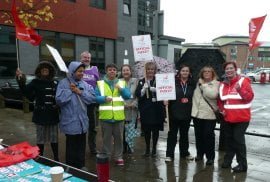On Monday 13th October, thousands of workers in the NHS and the Royal College of Midwives came out on strike to protest against years of low pay. We publish here two interviews with health workers on the picket lines in Coventry.
It was wet, windy and cold, but despite some pickets not being able to feel their feet, their enthusiasm for the action was not diminished. I spoke to two pickets from Unison.
MC works in Mental Health:
“We are out on strike because we have not had a pay rise for 5 years and when we did get one, it was 1%. Why should the MPs get 10% and we get nothing? We work hard and we do hours that we are not supposed to do that we do not get paid for. That is why we are here on this picket line this morning.
“It is time the unions did something for us and that is why we are all out. The system only survives because of our goodwill. We work long hours voluntarily as the work needs to be done, but we are left with no pay rise when the cost of living is going through the roof, and when gas and electricity costs are rising. And we are amongst the lowest paid. Utility bills and food bills are shocking. That’s the hardest thing. And we have no extra money to pay for them. As admin workers we are amongst the lowest paid.
“In addition, they are now talking of downgrading us, which will make things worse. So we are out here fighting. I want the unions to get a bit stronger and fight for us. They don’t seem to be fighting like they used to. They don’t seem to be in contact with us. I find it very difficult with the reps not keeping in contact. I had to go and find out about this strike myself. So the unions must not only fight but also keep the members on board.
“There are a number of issues that need to be sorted – low pay, long hours, bullying at work and the unions should be stronger so that instead of us going to look for information, we need more union reps on the ground.”
CM, Unison rep, has been working in Mental Health for the past 15 years:
“We haven’t seen such an erosion of pay for a very long time and it’s very unusual for us to take industrial action in the NHS. Wages have been depressed and have not kept up with the rise in the cost of living. People are very angry. This is the first time we have been out on pay issues for more than 30 years, since 1982. MPs are getting a very tasty 11% pay rise compared to our un-consolidated 1%. And you only get that if you are at the top of your pay scale.
“There is a huge disparity in pay and the government is not even taking into account the recommendation of the pay council about awarding the 1%. It is all shockingly unfair. The agreement we have always had is that as you get more experience and work longer in the NHS, you move up the pay grade and get extra money. Now, without consultation, if you are moving up the grade, you do not get the 1%. It is grossly unfair. It would be good if the government listened to their own pay review body, a body that they appointed.
“Those at the bottom of society are paying for the crisis. If there was even a 10% tax on the very wealthy, the top 1% who have wealth of £519bn, that would go a long way to paying for the crisis. Their standard of living would not be affected greatly if they lost 10%.
“As regards the upcoming elections next year I find the rise of UKIP very disconcerting. I hope that people see how unjust and unequal society has become since the Tory-led Coalition came to power. I also hope that Labour do not swing to the right in response to UKIP. I am trying to be optimistic but I am not necessarily.
“I would like to see a huge change in the way that wealth and opportunity are distributed. A lot of research has been done in recent years that shows that societies that are unequal do not function very well. They function far less effectively across the board. In unequal societies even the rich are not as happy as they are in more equal societies!”
Interviews conducted by Darrall Cozens, President of Coventry TUC (personal capacity)






